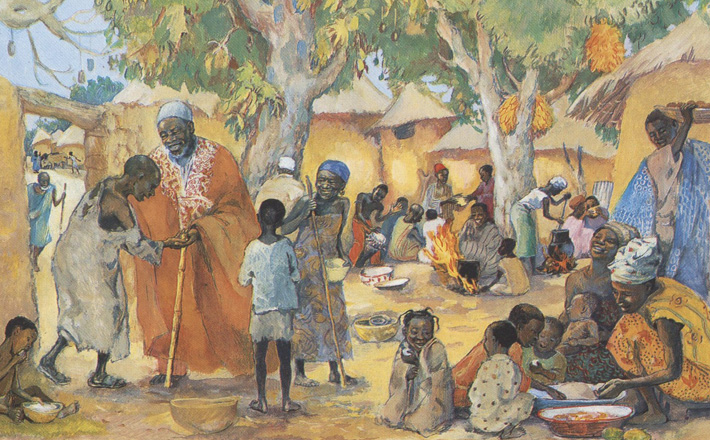Commentary on Psalm 112
Psalm 112 is an alphabetic acrostic that presents us, the readers, with a totalizing view of its subject matter: the happy life.
Our psalmist, in writing these twenty-two lines that correspond to the twenty-two letters of the Hebrew alphabet, has attempted to be both artistic and thorough. That the psalm does not achieve the high artistry of its twin, the similarly acrostic Psalm 111, or the wide-ranging thoroughness of Psalm 119, also an acrostic, should not distract us from appreciating what it does achieve. The psalm gives us an admirably honest and yet optimistic understanding of life, attentive to the vicissitudes of historical existence and yet faithful to the ancient teaching of the Wisdom tradition that a life characterized by the fear of the LORD is ultimately a happy one.
The Happiness of the Righteousness
Happiness, the psalmist maintains, has its roots in life lived out in “the fear of the LORD,” that is to say, a life that conforms to the teachings of the Wisdom tradition (112:1).
The psalmist agrees with the Book of Proverbs that “the fear of the LORD” is the “beginning of wisdom” (Proverbs 9:10; Psalm 111:10) and also with the Book of Job which, in the surprising and beautiful panegyric to wisdom, affirms: “Truly, the fear of the Lord, that is wisdom” (Job 28:28). Thus the psalmist fittingly describes the wise fearer of God in stock phrases taken from Wisdom literature: “He greatly delights in [God’s] commandments” (112:1b); he is “gracious and compassionate and righteous” (112:4b); “he gives freely to the poor” (112:9a); and “his righteousness endures forever” (112:9b). In short, the fearer of God belongs squarely in the company of the wise and conforms to the ideals of Wisdom.
Predictably also, then, the wise fearer of God is said to be blessed in all the ways we might expect such individuals to be blessed — according to the retributive theory of justice. “His descendants will be mighty in the land” (112:2a); “wealth and riches are in his house” (112:3a); “his heart is steady; he will not fear” (112:8a); and “his horn will be exalted in honor” (112:9c). The fate of the righteous and upright person, who fears God and turns away from evil, is happy and blessed — in stark contrast to the fate of the wicked who look on him with vexation and anguish from their ash heap (112:10).
It would appear that Psalm 112 presents us with a stable world governed by the principles of Wisdom, a world that is free of tragic drama and heartache and is full of orderly happiness.
The Suffering of the Righteous
It would be a mistake, however, to dismiss the psalm as a pious fiction and the confession of a naïve student of Wisdom. The world of Psalm 112 is no stranger to evil and suffering. If we look carefully, we see that “darkness” (112:4), “evil tiding” (112:7), “foes” (112:8), and the “wicked” abound in this world and threaten to overshadow the light of the wise. It may even be said that the psalmist understands darkness as an always already given that the wise must penetrate and outshine for their own sake and for the sake of others.
Indeed, far from already blessed, the hero of the psalm suffers false reports and the thousand needles with which his foes try to bleed him. The psalm explains that the wise must persevere through present troubles and hold on to righteousness and to faith that God will, in his life or in the lives of his descendants, recognize and reward his steadfast devotion to Wisdom:
For never shall the righteous be moved
and forever be remembered.
He does not fear evil tidings;
his heart is firm, secure in the LORD.
His heart is steady; he does not fear,
till when he shall look upon his foes. (112:6-8)
The psalm does not so much teach as it preaches. It does not celebrate present blessedness but encourages future faithfulness. It is not a description of a well ordered world in which righteousness is equal to blessedness but an exhortation to faithfulness in a tumultuous and altogether human world. Our world of historical contingencies, of both mundane evil and everyday goodness.
The Path of the Righteous
What does the path of the righteous look like?
The psalm itself has little to say in response to this question. Rather, it directs us elsewhere. It points, as noted above, to Proverbs and perhaps also to Job. It also points to other psalms, like Psalm 1 (with which it shares a common beginning, “Happy is…”), Psalm 111 (with which it shares a common poetic form as well as the theme of the “fear of the LORD”), and Psalm 119 (another Wisdom psalm written in acrostic form).
But the little Psalm 112 does say about the path of the righteous is important. The psalm expresses concern for the poor as is characteristic of biblical literature and claims that wisdom and righteousness find their expression in the practice of everyday life:
It is well with the one who lends graciously;
He conducts his affairs with justice. (112:5)
At the heart of a righteous and wise life is the mundane matter of money and everyday business affairs. What it means to lend graciously and to conduct one’s affairs with justice is ambiguous. What is significant, however, is the assumption that right living, which leads to happiness, concerns money and the affairs of daily life. Wisdom, the fear of the LORD, finds expression not so much in pious religiosity but in the practice of everyday life, not so much in church and synagogue, but in schools and offices. This perhaps is no surprise to students of Proverbs and Wisdom literature generally. But it is a fine reminder nevertheless.
Happy is the one who fears the LORD.
He conducts his affairs with justice.


August 28, 2016